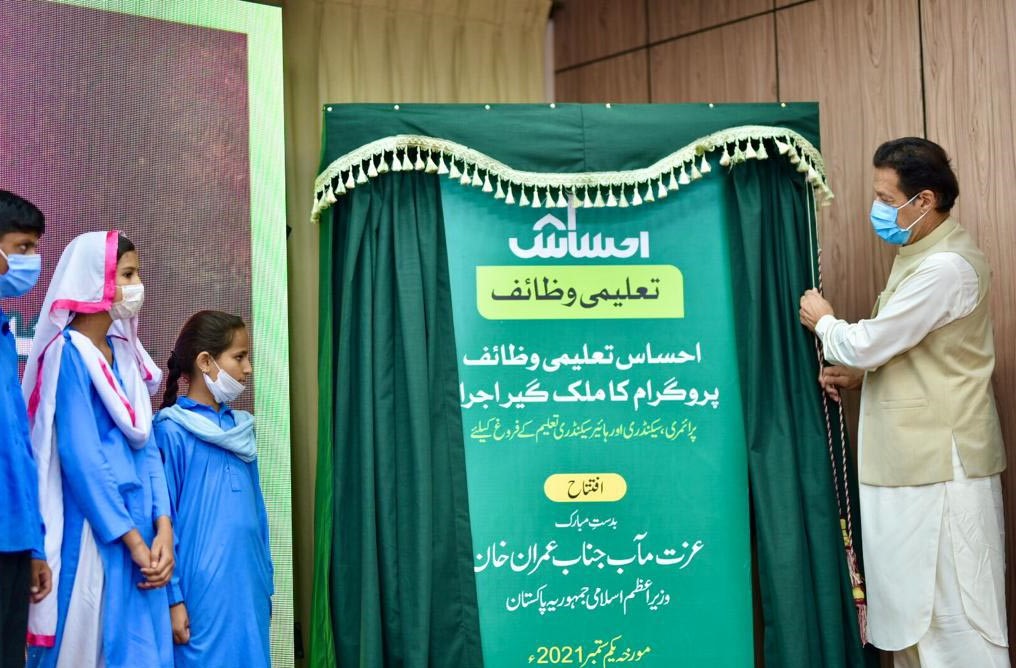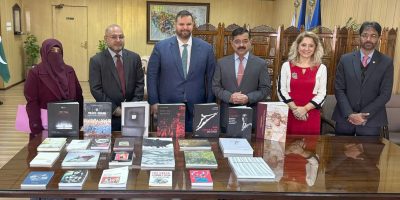Govt incentivizing education sector: PM

Prime Minister says educated woman could contribute more positively towards the society and lauded the policy of Ehsaas Stipends programme to give higher amount to girls
Shujaat Hamza
ISLAMABAD: Prime Minister Imran Khan on Wednesday said the government was focused on providing education to all children across the country and giving incentives to prevent dropouts from schools.
Addressing at the launch of Ehsaas Education Stipends programme here, the prime minister said as over 20 million children in the country were out of schools, efforts were underway to ensure their inclusion in the educational mainstream.
The Ehsaas Education Stipends programme was aimed at providing financial assistance to the deserving households for the education of their children at primary, secondary and higher secondary levels.
Rolled out nationwide in 160 districts, the programme had been structured to give higher amount of stipend to girls as compared to boys.
The prime minister said ensuring education for all was a priority of the government, adding that stipends as incentives would be a step to encourage parents for sending their children, particularly girls to schools.
He said an educated woman could contribute more positively towards the society and lauded the policy of Ehsaas Stipends programme to give higher amount to girls.
Terming educated human resource a great asset for a nation, he said it was important to provide educational opportunities to both boys and girls.
He dismissed the impression in western world that Pakistanis did not want to educate their girls.
He recalled that during his visits to different parts of the country, he found no such parents opposing the right of education for their daughters. However, he said the factors including distant schools or unavailability of female teachers could be a reason.
Imran Khan said it was mainly the responsibility of the government to provide facilities of education to all.
He appreciated that by use of information technology, the stipends would be disbursed transparently after proper checking of fake entries and ghost schools.
The Prime Minister also announced a one-time Ehsaas graduation bonus of Rs. 3,000 to encourage girls to complete primary education. This award would be given to girl students completing Grade 5 from Ehsaas eligible families. The graduation bonus had been designed to encourage girls’ education till secondary level.
PM’ Special Assistant to Social Welfare, Dr. Sania Nishtar, said under the Ehsaas Education Stipends, the primary school boys would get quarterly stipends of Rs1, 500 and girls Rs 2,000; secondary school boys would get Rs 2,500 and girls Rs3, 000; and at higher secondary level, boys would get Rs 3,500 and girls Rs 4,000 a quarter.
She said all educational stipends would be paid biometrically to mothers on attainment of 70 percent attendance of their children.
She said as part of ‘Post-COVID-Ehsaas Strategy’, Ehsaas Education Stipends would empower the deserving families to overcome financial barriers in accessing higher education.
Poverty was one of the most persistent barriers to acquiring education. Presently, there were 18.7 million children in the age group of 6 to 16 who remain out of school in the country and the fall out of COVID-19 has also accentuated it.
The Education Conditional Cash Transfers were an important pillar of Ehsaas and are included in the Ehsaas framework as Policy #73 ‘Education Conditional Cash Transfers’.
The Education Conditional Cash Transfers (CCT) served the dual purpose of socially assisting vulnerable households and at the same time reduced the number of out of school children, which was an important outcome for Pakistan as there were approximately 18.7 million out-of-school children in the country.
Pakistan had been running an Education Conditional Cash Transfer for primary school going children called Waseela-e-Taleem since 2012 in selected districts. The programme encountered a number of challenges including high administrative cost charged by Non-Government Organizations that were administering the programme, high error and fraud due to the programme being paper-based, weak compliance monitoring, limited human resource to enroll students into the programme and low stipend amount being given to children.
Related News

Romanian studies inaugurated for first time in Pakistan at NUML
Ambassador Dan Stoenescu expressed his sincere appreciation to the Institute of the Romanian Language, theRead More

Pakistan Study Centre inaugurated at China’s Shandong University
SHANDONG, DEC 19 /DNA/ – The Pakistan Study Centre at Shandong University was officially inauguratedRead More


Comments are Closed